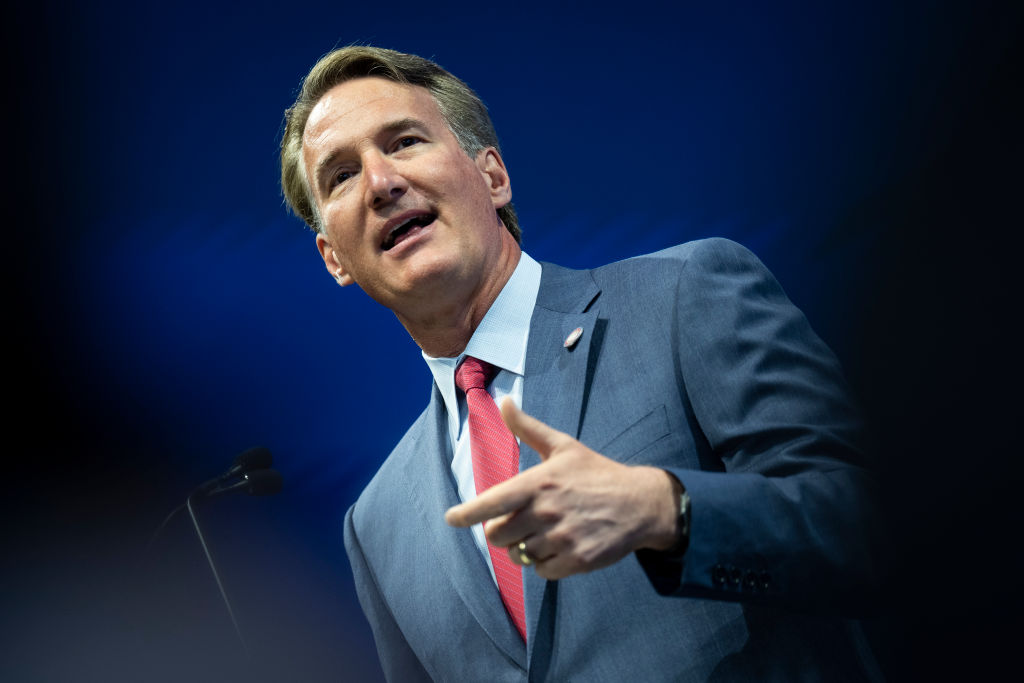Two months from today, voters in Virginia will decide control of the commonwealth’s narrowly divided House and Senate. Republicans control the 100-member lower chamber by four seats, while Democrats have a similar advantage in the 40-seat Senate.*
Both are very much up for grabs.
The race is rightly understood as a referendum on the leadership of Republican Gov. Glenn Youngkin. A recent poll from Roanoke College shows the term-limited Youngkin to be popular even as Virginians decisively favor Democratic President Biden in a potential rematch with former President Donald Trump. He enjoys an 18-point favorability advantage over Trump and 5 points over Biden.
More significant for November’s contest though, is Youngkin’s 7-point edge in job approval over the Virginia General Assembly. If the election really is a referendum on the governor, that’s a good augury for Republican chances.
National interest in the race has centered not on the political direction of Virginia, though, but rather the next step for Youngkin. Since his surprise victory in 2021, Youngkin has been a symbol of hope for Republicans during a dark period for their party. Like Chris Christie in New Jersey during the Obama years, Youngkin’s success in winning office and governing has offered a tantalizing alternate plotline to the dominant story: While Republicans nationally are divided and alienated from swing-state voters, a conservative GOPer has thrived in a blue state.
The result, much as it was for Christie in 2012, has been an effort to draw Youngkin into the presidential race. Whether Youngkin is leveraging national attention to his advantage in Virginia’s midterms or the other way around is as yet unclear, maybe even to Youngkin. Is pushing off a Shermanesque rejection of a 2024 run a way to keep donor and media attention on the state contests? Or is the battle for control in Richmond a skirmish that foreshadows a national campaign?
That depends on the outcome. If Republicans fall short, Youngkin won’t have to worry about being drafted. If Republicans clean up, the calls for him to play white knight will intensify, and Democrats and rival Republicans would say the midterm delay was just a stunt.
But that would miss the reality of just how politically fluid things are in Virginia right now and how little we really know about the electorate heading into the heat of the 2024 campaign.
Looked at one way, the 2024 map appears grim for Republicans in states like Virginia, which holds a great deal in common with swing states like Georgia, Arizona, and Wisconsin. Aside from Trump’s well-established deficiencies with college-educated suburbanites, the effort by Republicans at the state level to restrict access to abortions has been a serious drag on the GOP.
Virginia will provide crucial insight on how much that issue resonates with voters. Youngkin is pushing a ban on elective abortions after 15 weeks of pregnancy, which mirrors the national legislation supported by pro-lifers like former Vice President Mike Pence and South Carolina Sen. Tim Scott. Current Virginia law allows elective abortions until late in the second trimester.
That makes Virginia a particularly clean experiment for gauging how significant abortion will be for 2024, a question that could determine not just Biden’s reelection bid, but control of the U.S. House and Senate.
Youngkin is framing his pitch around kitchen-table issues—pragmatic pitches on jobs, public safety, and education—but is unabashedly pro-life and promises to use unified government in Richmond to advance the new restrictions if given the chance.
Democrats will surely make their case to swing voters very much around the question of abortion. The decisive defeat last month of an Ohio ballot measure that would have made it harder for pro-choice advocates to amend the state constitution was just the latest evidence that the issue is a powerful motivator for Democratic voters. But will it move suburban swing voters in a race with so much else to consider?
Two of the four most competitive state Senate seats are in the exurbs of Washington, and the other two are in the Tidewater region on the Atlantic coast. The seven most competitive House districts follow a similar pattern, with the addition of a few seats in the Richmond suburbs. All the Senate districts and all but one of the House districts supported Youngkin in 2021 but backed Democratic candidates in the 2022 congressional midterms.
If those voters go back to the GOP despite all of the focus on abortion and with Trump—who is direly unpopular in the state—in the news every day for his criminal cases, Republican strategists will rejoice. That would be solid evidence that swing voters are able to compartmentalize Trumpism and abortion as they did in many races in 2022. That’s how Georgia Gov. Brian Kemp stormed to reelection even as Trump-backed Senate candidate Herschel Walker failed.
If Democrats hold on or enlarge their numbers in Richmond, however, it will point the way to victory in 2024. Facing a popular governor and generally good feelings about the direction of the commonwealth, Democrats need to nationalize the contests in Virginia. If they succeed, it will show Team Biden that the issue set and concerns about the direction of the Republican Party can be enough to prevail nationally.
Whether Youngkin decides to make a late entry into the presidential race or not may end up being a less important consideration than what we learn about voters eight weeks hence.
*Correction, September 12, 2023: This article originally misstated the number of seats in the Virginia Senate.









Please note that we at The Dispatch hold ourselves, our work, and our commenters to a higher standard than other places on the internet. We welcome comments that foster genuine debate or discussion—including comments critical of us or our work—but responses that include ad hominem attacks on fellow Dispatch members or are intended to stoke fear and anger may be moderated.